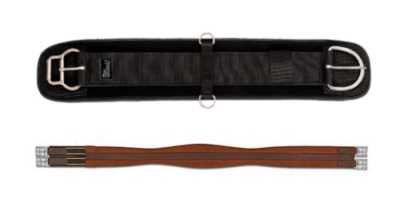|
By Jerry Tardif
Tightening a girth or cinch can be a problem for some horses.
Sometimes, it's just the horse.
At other times, there's an actual physical reason that must be investigated and corrected.
We'll discuss these issues in this article.
Just for clarity, girths are used on English saddles and cinches on Western saddles.
However, this kind of problem can pertain to any saddle type.
In addition, people often think this is only a girth/cinch question, but if you think about it, tightening up the girth/cinch is pulling the saddle down tight against the horse's back and the process also pulls the girth/cinch straps against the horse's side.
So, we need to look at the entire setup.

A Cinch (top) and a Girth.
Start with your horse.
Is there any reason he might be sore?
Could he have strained himself recently?
Has he been overworked?
Is there any reason you should suspect that there is a physical problem with his back, sides, or stomach?
Next, look at your horse's stomach and sides where the cinch lays.
Do you see any injuries there?
Are there any scrapes, bruises, cuts, or other wounds?
Are then any insect bites, such as from a tick, evidence of a bee sting, or raw flesh from constant fly attacks?
Now, let's move on to the saddle.
Does it properly fit your horse?
Even if it was custom made for your horse, that only means the saddle fit properly at the time it was made.
Has your horse gained or lost weight since then?
That can affect the fit.
Finally, look at the cinch itself.
Does it have any burrs, prickers, or slivers stuck to it that could irritate your horse's stomach?
When you connect the cinch, is there any chance you're pinching your horse's skin on the sides?
Could you have gotten any skin caught in strap rings or pulled through a buckle?
If everything looks ok, then your horse might just be sensitive to having his ribcage compressed as you tighten the cinch, so try doing it in stages when you next saddle up.
Tighten a little until your horse responds and stop.
Let your horse relax and get used to the slight pressure.
You can even walk away to do something else or put his bridle on.
When done, tighten the cinch some more, again, only until he makes a slight response.
Then, walk him outside or into the arena and tighten and check his cinch one last time before mounting.
Even if your horse inflates his chest when cinching, he'll have long since exhaled by the time you tighten the second time.
He'll also get used to cinching in stages and you'll have given him and the saddle a little time to "settle in".
If you've found no problems with your horse, such as an injury or insect bites, and you know he hasn't been overworked and has no reason to be sore, but even tightening in stages has not resolved the problem, it's time to have your vet take a look at the horse.
There can be some underlying issue that the non-medical person can't find, but that a veterinarian can check and test for that may be ailing your horse.
We need to remember that strapping a saddle onto a horse is not a natural feeling for him.
He needs to get used to it.
Even when he does, it's up to us to assure there are no other factors that could contribute to soreness or pain, such as those mentioned above.
Besides being an avid trail rider, Jerry Tardif is a technology consultant and a horse and nature photographer in SE Connecticut — see his work at: www.jerrytardif.com.
He is also co-founder and President of QueryHorse.
Back to Article Index
|